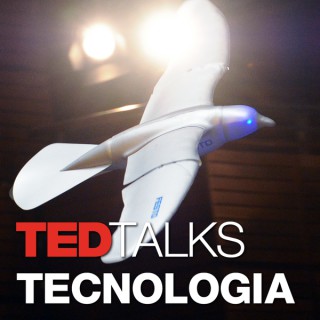Podcast appearances and mentions of leila takayama
- 10PODCASTS
- 11EPISODES
- 28mAVG DURATION
- ?INFREQUENT EPISODES
- Jun 10, 2024LATEST
POPULARITY
Latest news about leila takayama
- Performer-MPC: Navigation via real-time, on-robot transformers Google AI Blog - Mar 3, 2023
Latest podcast episodes about leila takayama
In this episode of Talk Nerdy, Cara is joined by cognitive and social scientist, Dr. Leila Takayama. They talk about Leila's work exploring human-robot interaction. Follow Leila: @leilatakayama
2470. 114 Academic Words Reference from "Leila Takayama: What's it like to be a robot? | TED Talk"
This podcast is a commentary and does not contain any copyrighted material of the reference source. We strongly recommend accessing/buying the reference source at the same time. ■Reference Source https://www.ted.com/talks/leila_takayama_what_s_it_like_to_be_a_robot ■Post on this topic (You can get FREE learning materials!) https://englist.me/114-academic-words-reference-from-leila-takayama-whats-it-like-to-be-a-robot-ted-talk/ ■Youtube Video https://youtu.be/epL9v7P352A (All Words) https://youtu.be/We3sLjN-vsg (Advanced Words) https://youtu.be/7JxeKBk3zV0 (Quick Look) ■Top Page for Further Materials https://englist.me/ ■SNS (Please follow!)
The 1980s promised robotic servants were in reach. They'd clean up our houses. Bring us drinks. Usher in an era of leisure. We didn't get robot butlers. But if we look around, we'll find an army of robotic servants already automating away domestic drudgery. Richard Rowland recounts the extent to which Androbot over-promised on its ability to build a robot servant. 40 years later, we still don't have robot maids. Monroe Kennedy III walks us through the complexities of seemingly simple tasks. To make things more difficult, each attempt to build a robot had to build the hardware AND write the code from scratch. Keenan Wyrobek explains that's why he helped write and share the Robot Operating System (ROS). Leila Takayama describes how beneficial ROS was to the field of robotics. And Terry Fong shares how NASA is using ROS to build the robots that explore our solar system.If you want to read up on some of our research on domestic robots, you can check out all our bonus material over at redhat.com/commandlineheroes. Follow along with the episode transcript.
This week we're hitting repeat on one of our favorite episodes: Listener Elizabeth wants to know if it's weird to say “please” and “thank you” to her Google voice assistant. ELT talks to former Alexa insider Daren Gill (now senior director of product at Spotify), and human-robot interactions expert Leila Takayama to find out whether people are typically polite to machines. Learn more about your ad choices. Visit podcastchoices.com/adchoices
Listener Elizabeth always says “please” and “thank you” to her Google voice assistant, and her husband says she’s weird. ELT talks to former Alexa insider Daren Gill and expert in human-robot interactions Leila Takayama to find out just how weird Elizabeth is. Plus, we right a #noboe wrong. Thanks to caller Elizabeth. Guests: Daren Gill, director of product at Spotify; human-robot interaction researcher Leila Takayama; oboe player Marcus Phillips.
We already live among robots: tools and machines like dishwashers and thermostats so integrated into our lives that we'd never think to call them that. What will a future with even more robots look like? Social scientist Leila Takayama shares some unique challenges of designing for human-robot interactions -- and how experimenting with robotic futures actually leads us to a better understanding of ourselves. Hosted on Acast. See acast.com/privacy for more information.
We already live among robots: tools and machines like dishwashers and thermostats so integrated into our lives that we'd never think to call them that. What will a future with even more robots look like? Social scientist Leila Takayama shares some unique challenges of designing for human-robot interactions -- and how experimenting with robotic futures actually leads us to a better understanding of ourselves.
우리는 이미 로봇과 함께 살고 있습니다. 식기세척기나 온도 조절 장치는 이미 우리 삶의 일부이며 굳이 로봇이라고 부를 필요도 느끼지 못하죠. 더 많은 로봇들이 함께하는 미래는 어떤 모습일까요? 사회 과학자 레일라 타카야마는 인간과 로봇의 상호작용을 연구하며 겪었던 독특한 체험을 들려줍니다. 그리고 로봇공학의 미래를 연구하는 일이 어떻게 우리 자신을 더 잘 이해하는 계기가 되는지도 말이죠.
Ya vivimos entre robots: herramientas y máquinas como lavavajillas y termostatos tan integrados en nuestras vidas que nunca pensamos llamarlos así. ¿Cómo será un futuro con aún más robots? La especialista en ciencias sociales Leila Takayama comparte algunos desafíos únicos de diseño para las interacciones humano-robot, y cómo la experimentación con futuros robóticos en realidad nos lleva a una mejor comprensión de nosotros mismos.
Já vivemos entre os robôs: ferramentas e máquinas como lava-louças e termostatos tão integrados em nossa vida que nunca pensaríamos em chamá-los assim. Como será um futuro com até mais robôs? A cientista social Leila Takayama compartilha alguns desafios únicos de design para interações homem-robô e o modo como a experiência com futuros robóticos nos leva realmente a um melhor conhecimento de nós mesmos.
Nous vivons déjà parmi les robots : les outils et les machines comme le lave-vaisselle et le thermostat sont tellement intégrés à nos vies qu'on ne penserait jamais à les appeler comme tels. À quoi un futur avec encore plus de robots ressemblerait-il ? La spécialiste en sciences sociales, Leila Takayama, raconte quels sont les défis propres à la conception d'interactions entre humains et robots et comment expérimenter les futurs robotiques nous conduit, en fait, à une meilleure compréhension de nous-mêmes.













